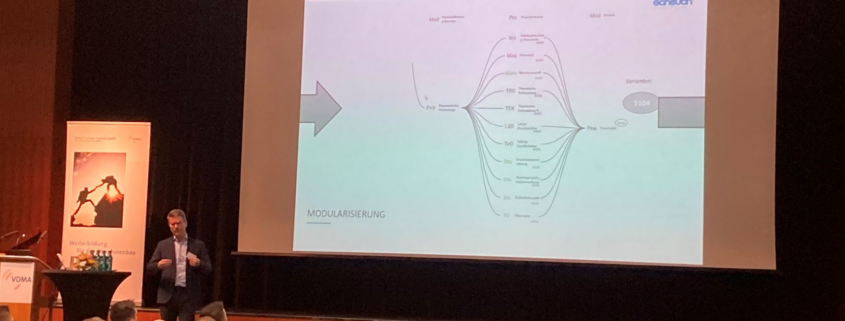Scheuch: From fog to cloud
Scheuch is the market and competence leader in the field of innovative air and environmental technology and offers its customers application-specific and high-quality solutions for their industrial air and environmental issues. As Head of Technology and Product Management, Stefan Hötzinger is leading the ambitious development of a new modular system.
You have been on the path “From fog to cloud” since 2019 – and enjoy high priority in-house. Waht advice would you give to others who would like their modularization project to have a similarly high priority? What was your experience in getting there?
I’m sure there are hundreds of ways. I’m happy to talk about mine. Scheuch has developed into an internationally successful company within 50 years. The management continuously develops our strategy, innovation is important and change is deeply rooted in our corporate culture.
Two years after I joined Scheuch, I was put in charge of the research department as well as product management. After many conversations, it became clear: this is a huge spider’s web in which everything is connected – we can no longer make progress with small incremental steps. I realized that it had become somthing bigger. Then I took part in the VDMA’s variant management conference. That encouraged me that we needed to take a more fundamental approach. In the beginning, it was all still very nebulous. Nevertheless, I started to talk about the topic with the management and it started to sink in more and more. And then came the go-ahead for the project.
What led you to decide to tackle the modularization project with Odego rather than alone?
We’ve already tried all this several times anyway – the result was pure frustration. And the realization: we will no longer be able to map this in Excel. We need people who can do this on a different level.
In addition to this competence, we need an outside perspective after ther frustrating attempts of the past. There are enough other companies that also deal with this. Why should we reinvent the wheel? We are good at building filters. We develop modular systems faster and better when we learn with others.
It was then impressive to realize how much I can really do with a professional approach from a database that was – in our case – not so clean to begin with. Anyone who tries this with Excel has no idea what an analyst can get out of it. And this is also feasible for small and medium-sized companies. With Odego’s tools, we can evaluate billions of variants in no time at all. And at relatively low cost. Because engineering and manufacturing without this transparency would be many times more expensive.
This is something we can’t do at a click from the start either: developing and maintaining this database is an ongoing task and a lot of work. The people who can do this will be indispensable in the future. Those who have this kind of data can do a lot with it.
What findings from this first project phase can you already pass on to others?
The most important thing is certainly to have as broad a team as possible behind the idea. After all, we have to take an entire company with us on a journey that is exciting but can also be scary. It’s not just a new laptop, it’s a real challenge for people. But it’s also a lot of fun to develop something new and ingenious for our customers.
What’s more, at some point you just need the courage to leave gaps. You can’t plan it all out in advance anyway, you have to start with the 80/20 approach. The first modular system is not the end. Of course you will be better and faster with the next one. The important thing is to just get going.
It’s like a journey that you can and should prepare for, but at some point you have to have the courage to set off and discover. The question of purpose will come up at some point anyway. The whole topic is not a sprint, but a marathon… (smiling)… where you have to sprint from time to time.



